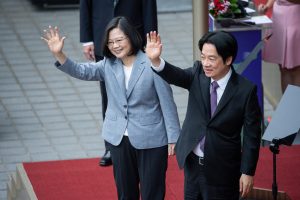After moving decisively to tighten its grip over Hong Kong, the Chinese government appears eager to ramp up its efforts to intimidate Taiwan. To that end, Beijing’s armed forces have conducted a series of provocative maneuvers around Taiwan and have signaled plans for a large-scale drill simulating the seizure of a strategic island under Taipei’s control.
While China’s actions do not portend a near-term invasion, they are driven, in part, by a sense of fear and embarrassment in Beijing, as the Chinese Communist Party (CCP) cannot accept that Taipei’s democratically-elected government proved more adept at responding to the COVID-19 pandemic.
Rather than minimize Beijing’s actions as an attempt to distract from the pandemic, the United States and its allies should embrace a bold diplomatic strategy and further knock China off-balance.
Since recognizing mainland China in 1979, the U.S. has carefully side-stepped cabinet-level meetings with Taiwanese leaders. To send an unmistakable signal to Beijing, Secretary of State Mike Pompeo should lead a senior bipartisan delegation to Taipei for meetings with President Tsai Ing-wen and her cabinet.
China would, of course, strenuously object to such meetings and threaten retaliation. Beijing made similar threats after President Trump’s 2016 call with Tsai as well as before previous dialogues between U.S. presidents and the Dalai Lama, such as the 2014 White House meeting between the Tibetan leader and Barack Obama. Yet the noise from Beijing was little more than bluster. The mainland’s threats would be especially hollow at the moment, given that Taiwan’s superior response to COVID-19 undermines the CCP’s legitimacy while Chinese citizens are confronting the economic fallout from the pandemic and quietly questioning President Xi Jinping’s leadership.
Meetings with Tsai and her cabinet would send a strong message that Beijing does not get a vote in our diplomatic engagements and that U.S. decision-makers from both parties are willing and eager to stand up to China’s threats. A fitting figure to join Secretary Pompeo would be the chair of the House Foreign Affairs Committee, Rep. Eliot Engel (D-NY), a principled advocate of human rights and a strong defender of Taiwan.
While the White House’s recently released China strategy details the severity of the threat Beijing poses to the United States and its allies, the report is short on bold ideas for strengthening America’s partnership with Taiwan.
One key proposal for the U.S. delegation to discuss in Taiwan is a bilateral trade deal to help the island diversify its economy and reduce its over-reliance on China. In support of a deal, the U.S. Senate unanimously passed the TAIPEI Act, which urges both countries to begin negotiating a trade pact and for the U.S. to develop a strategy to support other countries that have “strengthened, enhanced or upgraded relations with Taiwan.” While there will likely be sticking points around the import of U.S. beef and pork, enhanced economic cooperation between Taiwan, the United States, and other allies would go a long way toward inoculating the island from Beijing’s economic bullying and help lift the broader global economy following the post-pandemic downturn.
The Trump administration should also re-think its plans to withdraw from the World Health Organization (WHO) and instead demand that Taiwan be allowed to join the international body as part of any future restructuring efforts. Given the president’s fondness for criticizing Beijing’s handling of COVID-19, he should welcome the opportunity to hold up Taipei’s pandemic response as a model for other countries to emulate. The blow to China’s psyche would be palpable, as Beijing has been working in overdrive to assume key leadership posts in international fora in an attempt to rewrite the U.S.-led rules-based order.
It’s also time for the United States to leverage China’s COVID-19 deceptions to shore up broader international support for Taiwan, as Taipei’s circle of friends has steadily decreased over the last few years. For starters, the United States should quickly and discreetly begin engaging those countries most likely to consider switching recognition to Taiwan and then work behind the scenes to incentivize such announcements. This novel tactic has the secondary effect of differentiating our peaceful, diplomatic approach with China’s menacing behavior.
Lastly, the U.S. government should get creative about asymmetric ways to challenge China’s aura of invincibility in the South China Sea. These overt or covert actions could initially focus on campaigns aimed at exposing Chinese malign activities, such the sinking of a Vietnamese fishing vessel by the Chinese Coast Guard, as well as symbolic gestures, such as peaceful military flyovers of contested airspace and increased intelligence sharing with regional partners.
The time has come to put old thinking to bed and embrace big, bold ideas. It is clear China already has. Perhaps it is finally our turn.
Craig Singleton is a national security expert and former diplomat who currently serves as an adjunct fellow at the Foundation for Defense of Democracies (FDD) for its China Program.

































